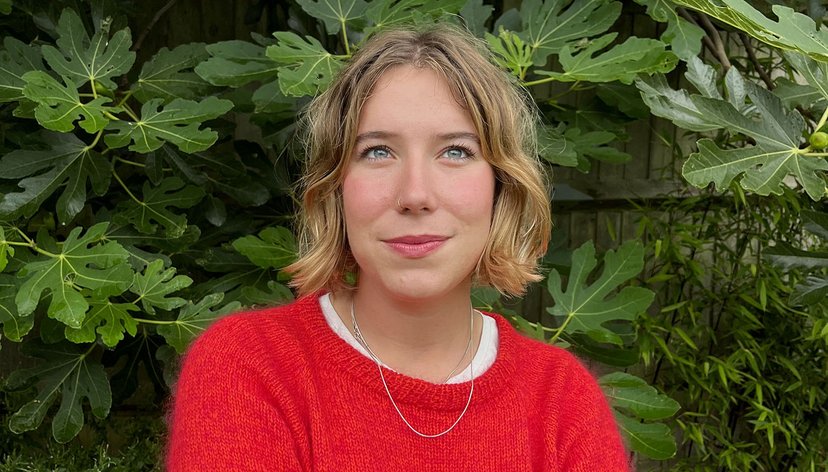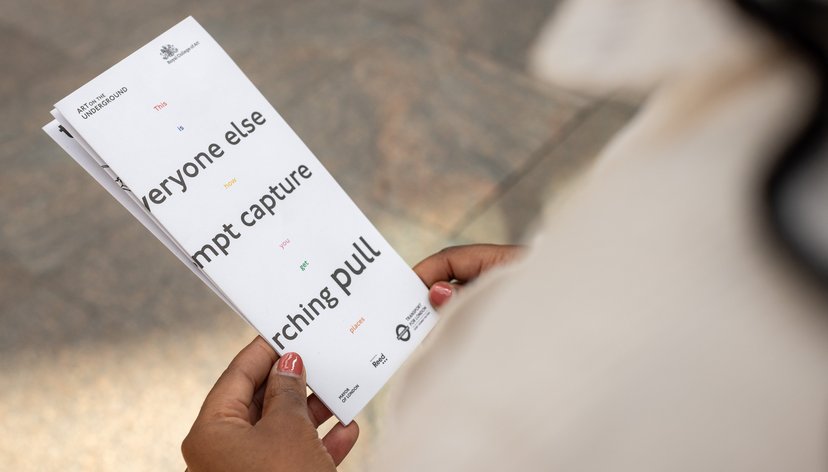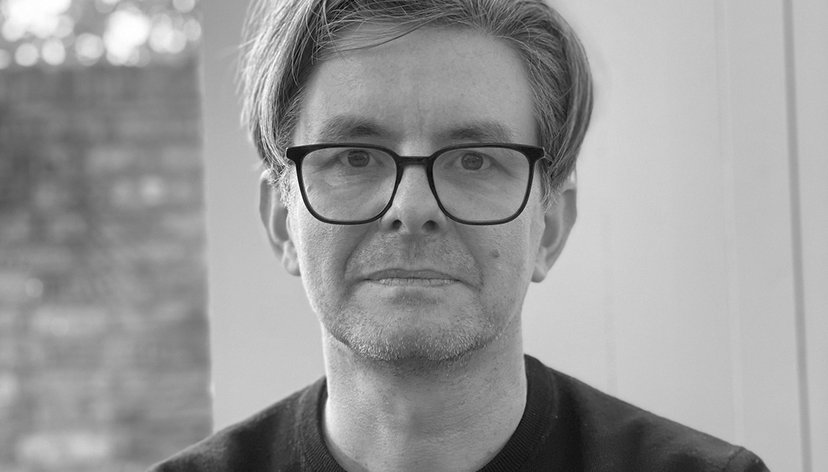
Key details
Date
- 5 November 2024
Read time
- 6 minutes
Read an extract by Royal College of Art Writing MA graduate Hugo Hagger and discover how the programme supported his philosophical exploration of writing and narrativity.
Key details
Date
- 5 November 2024
Read time
- 6 minutes
Before coming to the RCA, Hugo Hagger (Writing MA, 2024) studied BA Fine Art at Goldsmiths University. He joined the RCA’s Writing MA programme to gain the input of others on his writing. “I reached a point where I needed to meet the ideas I was having with other readers in this very structured way,” he explained. The programme also appealed to Hugo because of its grounding in art and his interest in the tutors’ own writing.
For his Independent Research Project – the culmination of the Writing MA programme – Hugo wrote a fictional text incorporating ideas and language from narrative theory, queer theory and poetics. The text explores the process of writing itself, drawing a parallel between the sculptural act of assemblage and that of writing.
Hugo was the joint winner of the annual Writing Prize, awarded to the graduating students that show great ambition. As Jeremy Millar, Head of Programme, Writing, commented: “When Hugo mentioned his idea of using the ‘sleeping dummy’ – the trick we see people play in films to make others think that they’re still in bed when in fact they’ve long gone – I thought it was both brilliant and simple, like the trick itself. And this is what his project has become, not just what it describes: something which seems to be known, and observable, yet is actually at work elsewhere, imaginative and free.”

The work you produced on the Writing MA programme is an exploration of narrative theory that questions and challenges the ways that fictional texts are shaped by narrative tropes and conventions. What drew you to explore this topic, and why was writing a novel the way you choose to address these ideas?
I think calling it a ‘novel’ was always a useful straw man for me. Part of the energy of the text comes in the knocking of that word over, or in the heckling of some of its portent; THE NOVEL. Calling it solely a work of narrative theory felt too distanced – the text performs its subject (narrative) in a very interiorised or ‘method’ kind of way. By that I mean it enacts some of its thinking in an intrepid fictive sense and then points back at that action, rips off its fake moustache, and says “Here’s what that is, here’s what it might mean, you are reading a text”. It’s both a novel and a work of theory about the novel it is – I believe a third thing happens in the troubled interaction between those two registers.
“It’s both a novel and a work of theory about the novel it is – I believe a third thing happens in the troubled interaction between those two registers.”
Writing MA alumni
‘The sleeping dummy’ is a central metaphor in your text. What were you interested in exploring or expressing through this image?
In the storyworld a character assembles the sleeping dummy, a replica of himself, asleep, so he can go forth ‘as a dream’ and write the world in this kind of theoretical, unencumbered state of escaping.
I was going to make a series of sculptures initially, sleeping dummies are so visually interesting and variable that I thought it might work. I discovered that their mechanism involved certain important features of the queer narrative theory I was reading. Ideas of emancipation, revelation, assemblage etc. So I started thinking about a sleeping dummy as a system to tell a story. This meant that each section must necessarily involve an escape, the revelation of a body, and some kind of assembly or disassembly – that’s more for me than a reader. The sleeping dummies’ painful tropey-ness is also a more general signal to the reader that narrative itself is what’s under the microscope here.

What draws you to assemblage?
I like to write about found-object assemblage, and the readymade as analogs for writing. Writing, like rifling through a junk shop for material, is a process of selection and implementation. We choose words like a sculptor chooses their objects – they have similar depths in that they are pre fabricated, historicised, extant before they are selected to perform in a certain way. Writing and this kind of sculpture-making feel the same in that they are about the consequences of connection, the effects that occur when those ‘prefab’ objects sit in a certain relation and configuration with each other.
“Writing, like rifling through a junk shop for material, is a process of selection and implementation.”
Writing MA alumni
Your text is influenced by theoretical and philosophical texts on writing and narrative, as well as the fiction of others. How did the Writing MA programme expand your range of references and did it introduce you to any particularly influential or inspiring texts?
I was pushed to talk to Robert Glück quite early on, who is a hero of mine. All this other material then started to make itself known in the process of researching for that interview. One thing led to another, in that nomadic research way, and my tutors started to get a picture of what I was thinking about so my reading list just grew in the extreme. I found myself to be in very good company so I slowly became undaunted. My tutor Emily LaBarge told me to read Wittgenstein’s Mistress by David Markson and it kind of made me float off the ground.
“One thing led to another, in that nomadic research way, and my tutors started to get a picture of what I was thinking about so my reading list just grew in the extreme.”
Writing MA alumni
How did your writing develop while on the Writing MA programme? Were there any particular briefs, or experiences on the programme that had a big impact on you?
Being exposed to careful, sometimes incredulous readers is the most valuable thing for any writer. Somebody pointing at your writing and saying ‘this works, this doesn’t’ and telling you why they think that, makes you a really sharp reader of your own work. I think I got a lot out of it because every brief, perhaps unbeknownst to me at the time, directed energy to the final project, the one I am talking about here. I would recommend knowing, perhaps even in a general sense, what you care about and then keeping that thing in your crosshairs.
“Being exposed to careful, sometimes incredulous readers is the most valuable thing for any writer.”
Writing MA alumni
The following is an extract from Hugo's Independent Research Project: ‘I could hear the leaves rustling on the trees and the fragment smell of cut grass. Nearby a little girl stalked pigeons, taking up sudden velocities amongst the headstones.’

I had known tragedy, practically cubic in its convention. But this will not be detailed in the novel – I can reassure you of this. I will not include “I just wanted to check in with you.” or “how are you doing" or “call me soon”. I would like to intercept this, this will not be allowed to thrust into the picture plane – the body will not appear. The reader of my novel might attempt to identify the this in the that or the other, but metaphors swarm the numbered lines of any straying theories. The tragedy will not be detailed in the novel. The study of love and its curvature back to Stein – no. Nor will the quality of line that made his ear the most perfect of them all, not of all the ears, but of all the lines – an attempt of this kind will be foiled. The possessive second, will possess little of him, although each second with him was so full of world; a walking around or a perfect movie – these are refused – this line of inquiry is closed with a nope. My tragedy will not be detailed in the novel. A white egg in the privacy of a snowstorm no; the images do not qualify.
Knots of oiled rag, blonde wig, pillows tapered into feet, the white yarn is pulled in oscillating distances, weight is unevenly, but soundly distributed. I was at the end of the day not a writer, but a happy hoarder of artefacts; a sculptress whose solipsism allowed them to be both the king and his jester; pleasuring himself with one hand and pardoning himself with the other. The objects I had humbly strewn around were words and words were distinguishable from their support; ants marching over a white tile.
I could certainly make something happen.
Writing for me is born of a sculptural exigency; a hitch in the wood, a cooling of the fluids, the mutable body. The body of text (consisting of the objects I had humbly strewn around my bedroom floor) was everything which was the case – nothing was omitted. A blonde wig as straight and majestic as a white mare’s mane because in writing for there not to be a horse, even one scalped, would be inappropriate.
The phone rings.
I would write this to not require the phone be answered, but for the prickling of lightweight references that are suddenly drawn to such an audacious bit of theatre. Every encounter of this kind opens a window, or a door; a curtain over an oval airline window acts as a pivot in the change of scenery by becoming a hotel room curtain; a bathroom door doubles for both. A ringing phone becomes a shoo-in for a coffin, or a weaved basket. The phone and the coffin and the weaved basket are all suspensefully linked by their anxious contingency; a sentence of semicolons; an open set of possibilities.
The self is everything which is the case, but I have certain suspicions about myself. I am unreliable, but emotionally quite three dimensional. I give good advice, but I am constantly fretting over my being an ancillary effect. I am often ignored at work, you see. I have theories, many, many theories.
If the self is everything which is the case, everything necessarily enframes you, reader. And if the self is a fiction linked to socially elaborated situations, and you are part of the self, then through a series of explosions across linked vessels we will become fictitious together and we will go on fictitious dates, and we will fictitiously reach into each other’s bike shorts and, and, and we disappear fictitiously – like tears in the privacy of a rainstorm.
I wrap the ringing phone in a t-shirt and stow it away in the domed lace of the blonde wig.



